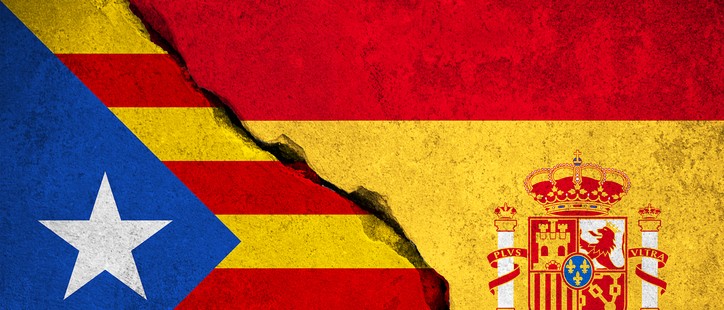Our Opinion: 2017
Spain’s Day of Unity

Last Thursday was not the best day to celebrate Spain’s Day of Unity. Two groups of protesters clashed in Barcelona, with people throwing chairs at each other before being separated by police. Spanish assets have, understandably, under-performed others in Europe and volatility will endure for some time as Catalonia’s declaration of independence is played out.
Even if recent announcements are positive steps to explore a reasonably constructive endgame, it will take long time for political and social tensions to ebb in Catalonia. Therefore, although further underperformance has become less probable, Spanish financial assets will continue to suffer somewhat higher volatility than other Eurozone assets.
The Spanish government has asked the Catalonian president to clarify by 16 October whether his speech on Tuesday is meant as a formal declaration of independence. Meanwhile, the Spanish government has initiated the process of taking administrative control of Catalonia if its government takes measures toward secession.
The main Spanish political parties have agreed to begin debating how to revamp the regional self-governing and financing system that, in six months, would initiate negotiations to change the constitution. These moves could spur an equilibrium solution that could de-escalate the Catalonian independence challenge.
Nevertheless, secessionist hard-liners are unlikely to be convinced; further futile steps toward independence should be expected. In any case, political and social tensions in Catalonia will ebb only slowly, and Spanish financial assets could go on suffering higher volatility than other Eurozone assets.
If succession is attempted, this will trigger the first step in the process of initiating article 155 of the constitution that would allow the central government to take administrative control of the region. This move, endorsed by all national parties but Podemos, could provoke some backlash from secessionist parties and will keep tensions high, but it ensures that the Catalonian government abides by the law.
More importantly, the Socialist Party leader, Pedro Sánchez, has announced that he has agreed with Prime Minister Mariano Rajoy and the Popular Party to set up a commission in Congress to reform the regional self-governing and financing system that, in six months, would lead to a debate on introducing changes to the Spanish constitution. If successful, this initiative could help to defuse the Catalonian independence challenge. It could also resolve some structural deficiencies in the Spanish regional and fiscal system.
News flow from Spain will likely be hectic in the coming days, as it is unclear how the Catalonian government will respond and what measures the Spanish government foresees, and what
Since immediate secession seems infeasible, the only possibility of compromise would be a more balanced regional funding system, greater autonomy, and more explicit recognition of historical and cultural singularities of regions such as Catalonia in the Spanish legal framework. The agreement reached by the three national parties (Popular Party, Socialists and centrist Ciudadanos, comprise roughly 70% of votes and seats in Congress) seems a first, but significant step in the right direction.
The initial agreement contemplates a two-tiered negotiation process:
Firstly, a commission in the Spanish Congress will analyze and debate for six months the current functioning of, and possible enhancements to, the current regional self-governing and financial system. If a consensus among main parties and regions is found, this should lead to a more balanced and sustainable tax revenue and public expenditure
Afterwards, another commission would debate what changes are required to update the 1978 constitution to accommodate changes in regional self-governing, funding, and other amendments due for some time. If an agreement is reached, that would lead to a long and cumbersome constitutional reform process. This could include snap elections and a referendum in late 2018 or in 2019. Even if this initiative finally succeeds, risks of failure are plentiful along this path.
Fierce opposition is likely from Catalonian pro-independence parties as secession will remain banned in the constitution and regional autonomy could only be marginally improved. Also, the agreement between the main parties will be hard to maintain when it comes to discussing the detail.
The Catalonian government is not really in full control of the process toward independence, which has been taken over by far-left radical parties and anti-globalization groups. This means that, following recent news and impediments to secede, demonstrations could result in riots, souring the social and economic climate. Depending on the response from the Spanish government, which constitutionally is able to take control of Catalonian functions such as the police, the situation could either be controlled or could enter a dangerous spiral with unintended consequences. If tension persists, it will affect investment and tourism.
One traditional complaint from nationalist parties has been that an excessive share of taxes paid by Catalonian citizens is being transferred to poorer regions, thus undermining economic development. In an attempt to respond to this claim, the Ministry of Finance asked a group of fiscal experts to calculate under different methodologies the net transfer of fiscal resources. It concluded that, contrary to common wisdom in Catalonia, taxpayers in Madrid bear most of the burden in the system.
This is a problem which could destabilise Spain for some time to come.
16th October 2017
